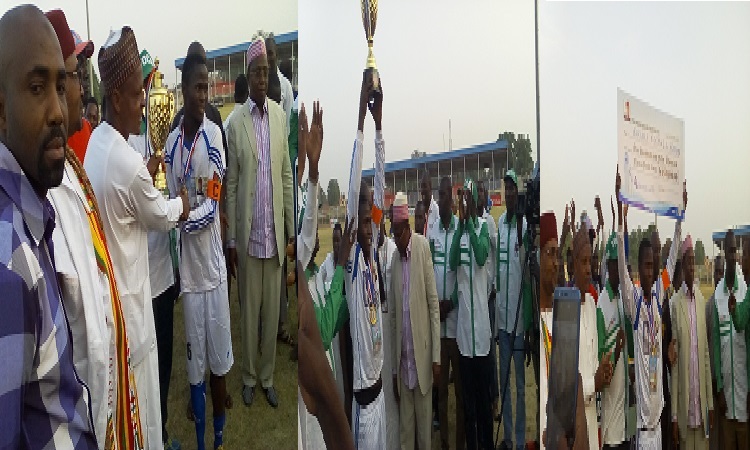Expert tells Media, Strengthen Investigative Journalism
Media men and women have become endangered species as they are exposed to lots of dangers in the course of carrying out their watchdog functions. While many are subjected to all manners of treatments, some even lost their lives in a bid to preserving democracy.
This has been a concern expressed during this year’s World Press Freedom Day.
The DG Media to former governor of Kaduna state, Mukhtar Ramalan Yero, Alhaji Ahmed Maiyaki speaking on the theme, ‘The Role of the Media in Keeping Power in Check, during the celebration organized by the Nigeria Union of Journalists (NUJ) Kaduna State Council had expressed worries over the challenges being faced by journalists in the course of carrying out their assignments.
Globally he said it has become a source of concern on how journalists are subjected to all manners of treatment citing that of April this year as the worst of its kind.
“Monday, the 30th of April this year was the deadliest day for journalists anywhere in the world since 2015. No fewer than ten journalists were killed in suicide bombings in Kabul, Afghanistan. Aljazeera and other top media organizations reported that 65 journalists were killed worldwide last year in the course of carrying out their assignments. The International Press Center (IPC) reported that at least two Nigerian journalists were part of the 65 journalists that were killed last year.
In Nigeria, there is also a serious concern about the continuous harassments and gang up against journalists by various government and security agencies in the country. Several journalists have been intimidated, arrested and jailed at various times by security agencies and some state governors including some of our colleagues here in Kaduna State within the last few years under Elrufai’s watch.
There is a growing sense that Nigeria is losing its democratic temperament based on declining press freedom rating. According to the 2017 World Press Freedom ranking compiled by Reporters Without Borders (RSF), Nigeria, again, recorded a decline in the international press freedom index, with six percent regression between 2016 and 2017. Nigeria came down from 111 in 2016 to 122 in 2017, out of 180 countries graded on the press freedom index. This indeed is worrisome.
Speaking, the media advocate of press freedom observed that despite the signing into law of the Freedom of Information Act by former President Goodluck Johnathan 7yrs back and the recent bold step by President Muhammadu Buhari’s led administration in joining the Open Government Partnership (OGP), much he said still need to be desired as information are still not handy to journalists.
“ It is now seven years down the line; the FOI law is yet to yield the desired results. Government business is still a secret, which hinders the role of the media in checking power. There is still a debate on whether the law covers the various levels of governments or the law ought to be domesticated by the various states assemblies to be effective at the state levels.
In 2011, the Jonathan led administration notably signed into law the Freedom of Information Act after 17 years of advocacy. The Act essentially encourages public institutions and government agencies to be proactive about publishing information. The Act also makes it mandatory for government institutions and agencies to provide such any information to citizens and journalists for the interest of the public.
Another opportunity for us as journalists to have access to information is the commendable decision of the Buhari led administrations to join the Open Government Partnership (OGP) as the 70th nation to do so, in July last year in the UK. The OGP is a global tool that enhances information sharing to engage with citizens in governance process in order to deepen institutional and policy reforms.
Lamenting, the Media Expert however stressed on the need for the media not to relent in their watchdog role as that is the way through which they can keep the government in check.
The growing intolerance towards the media by the ruling elite he said should not deter them from carrying out their responsibilities. He charged them to direct more efforts in investigative journalism citing the recent BBC report that had spurred the federal government into banning the production and sale of codeine syrup.
“The time has come for the Nigerian media to reflect on the glorious and sacrificial role it played during the last decades to rescue the nation from the growing intolerance at all levels of government. As we may be all aware today, the media is the cornerstone of democracy but there appears to be a growing global conspiracy against the media and journalists. And these challenges are rolling back decades of exploits of keeping powers in check across different lines”.
“Investigative journalism provides a very potent platform for the press to unravel what is known as “facts behind the facts” particularly in governance. The most recent example is the BBC’s documentary on Codeine, which led to the decision of the FG to ban the production and sale of the syrup.
And in line with the overall theme of this year’s celebration, it has become very important for the judiciary and the media to work together to keep powers in check, because power corrupts, absolute power corrupts absolutely. I urge the NUJ to make representation to the judiciary to seek for more protection and collaboration. After all, we occupy the fourth tier of the realm.
The media he has described as the cornerstone of democracy but how this has been left to fusion is a call to question.
Contributing, the SA Media to Governor El-Rufai Samuel Aruwan advised against unethical journalism. Journalism of hate, religious and ethnic divide which he said would only help in disuniting the people.
“Journalism must be rescued from agents of hate, religious and ethnic extremism”
Aruwan commended the council for its support in consolidating development and peace in the state.
“The skewed journalism of a few has not eroded the positive contribution s of the media in Kaduna state. You have been a key to peace and stability of the state. We have gained so much from consolidating development and peace of the state from your initiative and alive to responsibility.
We must collaborate to ensure journalism is practiced and separated from sentiments and emotions; we must do social re-engineering that will birth a path of ethical and responsible journalism anchored around the principles of balance, objectivity, fairness and impartiality. He stressed.
Responding on the issue of clampdown on journalists in Kaduna state, the Media aide denied any such intention by the state government saying that, the governor would pursue the cause of peace, development and unity of the state.
“We will sustain our partnership with the media and continue to accord them mutual respect as a critical partner”.
Earlier in his speech, the Council Chairman, Comrade Adamu Yusuf used the occasion to call on both the state and federal government to expedite action in the implementation of the special media salary scale.
Lamenting, he said, the media considering the roles and hazards they face in the discharge of their duties ought to be among the best paid in the country.
“Being the fourth estate of the realms, Nigeria Media ought to be among the best paid in the country considering their roles and the hazards involved while discharging their professional responsibilities.
“It is really sad that some private media organizations in Kaduna state and some based outside Kaduna state but with their staff here cannot pay regular salary to our members. Some are owing their staff up to a year, this is unacceptable and the NUJ will soon issue an ultimatum to these private media organizations to pay or face industrial action”.
Adamu also made reference to the deplorable condition of the retirees of the NEW Nigerian Newspapers (NNN) which many he said had died without receiving their pension that had lingered for years despite the fact that President Buhari had approved the payment six months back.
”It’s most unfortunate that our elders from the NNN are still waiting for their entitlements in May, 2018; meanwhile, President Buhari has approved the payment about six months ago. Why the delay? This is a question the that NUJ wants the pension company to answer at this critical time. Some of the retired members have died some presently sick while others are psychologically or mentally touched praying, waiting for a hope that only Alah knows when it would come”.












